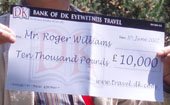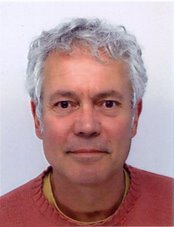 THE PLAN
THE PLANA week in Istanbul, a city I have long wanted to visit, not least because I work for two magazines with a Turkish flavour, Cornucopia and Taste Anatolia. Nothing was planned. I just wanted to stroll around, getting a slow drip, seeing the sights, taking boat rides, eating street food. I thought I wouldn't take many pictures this time. People don't seem to be able to look at things without holding up their digitals. I would take a tape recorder with a stereo microphone instead.
Note to Dreamtrip Prize organisers Dorling Kindersley and Rough Guides:
Why not give away free ambient CDs with your books: street sounds, music, chatter, the clack of backgammon, the ting of trams, honk of taxis, shouts of street vendors ("Excuse me, Sir, where you from?") so readers get the atmosphere as they study their travel guides...
I also packed a pocket book to write a diary (see below, click to enlarge). Of course I took a copy of Orhan Pamuk's Istanbul: Memories of a City, and I used some prize money to buy this pair of expensive, Camper, mooching shoes.
 THE HOTEL
THE HOTELThe Turkoman was right opposite the Blue Mosque and could not have been better located. Next to the Museum of Turkish and Islamic Arts, the rooftop terrace had a view over the Mosque, the Hippodrome's Column of Constantine VII and the Sea of Marmara (right). The mezzuen caller had just been judged the best in the city, and his call to prayer came around 5.25 each morning. I was glad I had the tape recorder.
It turned out to be Ramadan (Ramazan in Turkish). Every evening after sundown the whole Hippodrome area of Sultanahmet outside the Blue Mosque was a carnival of stalls, street food, and entertainment. There were free nightly shows of concerts, costumed bands, popular groups and whirling dirvishes and nobody got drunk. I kept the tape running.
There is lots of music in Istanbul. Not Western music, but genuinely popular Turkish music. A whole street in Beyoglu is taken up with shops selling musical instruments, all kinds of flutes to blow and string devices to pluck and strum. One night a waiter picked up a wine glass and used it as a microphone as he sang to the diners.

 THE SIGHTS
THE SIGHTSIt is easy to see the sights in Istanbul: you know where you are going before the start: Haghia Sophia, Topkapi, the Blue Mosque, the Bazaars, the Chora Monastery, Galata Bridge, Istiklâl Street in the New Town, where of course I visited the Pera Museum, not long ago converted from the old Hotel Bristol. (The engaging couple pictured on the far left are from a 2nd century BC sarcophagus from Salonika, in the Archaeological Museum)
Comparing Haghia Sophia with St Peter's in Rome, Robert Byron wrote: "The existence of St Sophia is atmospheric; that of St Peter's, overpoweringly, imminently substantial. One is a church to God; the other a salon for his agents. One is consecrated to reality, the other, to illusion. St Sophia, in fact, is large, and St Peter's is vilely, tragically small." Haghia Sophia did not disappoint; and I was very glad to see it at last. Topkapi Palace, too, with its passages and courtyards, its luminous tiles and seductive divans, its kiosks and balconies, pavilions and gardens was a breath of enlightenment. In Gülhane Park beside Topkapi a rabbit told my fortune: "You are entering a time of your life that is active and full of success," it said.
I mostly stayed around the old town, and found it was a succession of small communities, beyond the Süleymaniye Mosque, for example, where there are a few remaining wooden Ottoman houses, and the Kumkapi district where there is a fish market and restaurants by the Sea of Marmara. Even in the New Town there was a sense of community. In blocks of flats where immigrant Kurds and gypsies lived, food sellers regularly come by and people let down baskets on ropes to buy their wares.
Tourists were not numerous, mostly Spanish and Italian, and did not stray far from the main sights. People were great everywhere, and I felt safe as houses. Nothing was expensive, and I was hard-pressed to spend the £400 prize booty I had brought for the week.
THE BOAT TRIPS
Unquestionably a highlight.
1. A Bosphorus trip, starting at Eminönü quay at 10.30am, travelling up past the beautiuful yali waterside manors and small fishing villages with a 3-hour lunch stop at Anadolu Kavagi (pictured below left) on the Asian shore at the mouth of the Black Sea.
2. Princes' Islands. Catch an almost empty 8am ferry at Kalabas by the Dolmabahçe Palace for the two-hour trip to the islands (about £4 return), stopping at the last one, Büyükada, the largest. Unspoilt with no cars allowed, this is a beautiful backwater of handsome villas (Trotsky was exiled here), pine wood hills and rocky shores. I took a 90-minute phaeton carriage ride around the edge of it.


I did take a camera, and when I reached home I was surprised to find I had taken 400 pictures.










